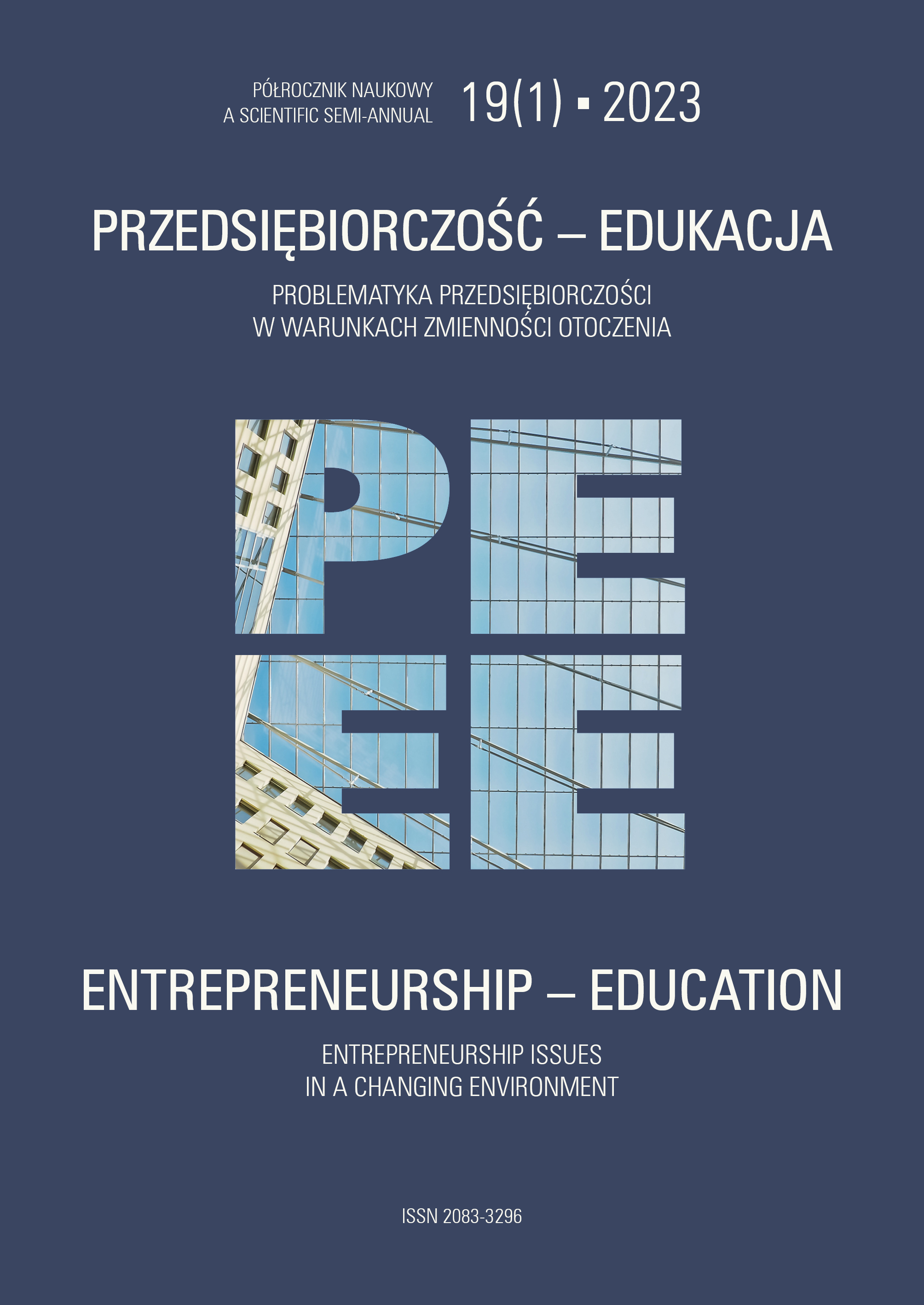Refleksje na temat edukacji w zakresie przedsiębiorczości z perspektywy ponad 40 lat badań naukowych
DOI:
https://doi.org/10.24917/20833296.191.1Słowa kluczowe:
edukacja przedsiębiorcza, edukacja w zakresie przedsiębiorczości, kształcenie w zakresie przedsiębiorczości, pedagogika przedsiębiorczości, przedsiębiorczośćAbstrakt
Celem artykułu jest krytyczna ocena dojrzałości edukacji w zakresie przedsiębiorczości jako usamodzielniającego się obszaru badawczego z perspektywy jego historii, ze szczególnym uwzględnieniem luk badawczych, a także wyodrębnieniem trendów badawczych, które mają szansę zintensyfikować jego dalszy rozwój. W artykule przedstawiono krótki rys historyczny edukacji w zakresie przedsiębiorczości i jej specyfikę jako obszaru badawczego z uwzględnieniem dynamiki rozwoju na przestrzeni lat, a następnie podjęto próbę określenia jej największych słabości oraz stojących przed nią wyzwań. Artykuł kończy analiza trendów badawczych prowadząca do refleksji nad dojrzałością tego obszaru badawczego. Wynika z niej, że pomimo zaistnienia nurtu krytycznego, edukacja w zakresie przedsiębiorczości jest jednym z najsilniej rozwijających się i obiecujących co do wyników obszarów wykorzystujących dorobek naukowy związany z przedsiębiorczością. Jednakże, choć z perspektywy ponad 40 lat zaawansowanie wiedzy z zakresu edukacji w zakresie przedsiębiorczości i będących w jej centrum procesów uczenia się jest widoczne, wciąż musimy doskonalić warsztat badawczy, by lepiej rozumieć, czego uczyć, jak uczyć, kogo uczyć oraz w jakim celu.
Bibliografia
Baumol, W.J. (1996). Entrepreneurship: Productive, unproductive, and destructive. Journal of business venturing, 11(1), 3–22.
Béchard, J.P., Grégoire, D. (2005). Entrepreneurship education research revisited: The case of higher education. Academy of management learning & education, 4(1), 22–43.
Carlsson, B. i in. (2013). The evolving domain of entrepreneurship research. Small Business Economics, 41, 913–930.
Clarke, T.E., Reavley, J. (1981). Educating technical entrepreneurs and innovators for the 1980’s.
Technovation, 1(2), 125–134.
Dainow, R. (1986). Training and education of entrepreneurs: the current state of the literature. Journal of Small Business & Entrepreneurship, 3(4), 10–23.
Dewey, J. (1946). Experience and education. New York: The Macmillan Company.
Fayolle, A. (2013). Personal views on the future of entrepreneurship education. Entrepreneurship & Regional Development, 25(7–8), 692–701.
Gorman, G., Hanlon, D., King, W. (1997). Some research perspectives on entrepreneurship education, enterprise education and education for small business management: a ten-year literature review. International small business journal, 15(3), 56–77.
Hase, S., Kenyon, C. (2000). From andragogy to heutagogy. Ultibase Articles, 5(3), 1–10.
Hägg, G. (2017). Experiential entrepreneurship education: Reflective thinking as a counterbalance to ac‑ tion for developing entrepreneurial knowledge. (PhD Compilation). Lund: Lund University.
Hägg, G., Kurczewska, A. (2022). Entrepreneurship education: Scholarly progress and future challenges.
New York: Taylor & Francis.
Hägg, G., Kurczewska, A. (2021). Toward a learning philosophy based on experience in entrepreneurship education. Entrepreneurship Education and Pedagogy, 4(1), 4–29.
Hägg, G., Kurczewska, A. (2020). Guiding the student entrepreneur – Considering the emergent adult within the pedagogy-andragogy continuum in entrepreneurship education. Education+ Training, 62(7/8), 759–777.
Hägg, G., Kurczewska, A. (2019). Who is the student entrepreneur? Understanding the emergent adult through the pedagogy and andragogy interplay. Journal of Small Business Management, 57, 130– 147.
Hägg, G., Kurczewska, A. (2016). Connecting the dots–A discussion on key concepts in contemporary entrepreneurship education. Education+ Training, 58(7/8), 700–714.
Hägg, G., Gabrielsson, J. (2019). A systematic literature review of the evolution of pedagogy in entrepreneurial education research. International Journal of Entrepreneurial Behavior & Research, 26(5), 829–861.
Henrich, J., Heine, S. J., Norenzayan, A. (2010). The weirdest people in the world? Behavioral and brain sciences, 33(2–3), 61–83.
Jones, C., Penaluna, K., Penaluna, A. (2019). The promise of andragogy, heutagogy and academagogy to enterprise and entrepreneurship education pedagogy. Education + Training, 61(9), 1170–1186.
Katz, J.A. (2003). The chronology and intellectual trajectory of American entrepreneurship education: 1876–1999. Journal of Business Venturing, 18(2), 283–300.
Knowles, M. (1984). Andragogy in Action: Applying Principles of Adult Learning. San Francisco: Jossey-
-Bass.
Kurczewska, A. (2016). Entrepreneurship Education built upon the concepts of experience and responsibil‑ ity. Łódź: Wydawnictwo Uniwersytetu Łódzkiego.
Landström, H. at al. (2022). What’s interesting in entrepreneurial education research? Identifying conversants sharing common interests in the field. International Journal of Entrepreneurial Behavior & Research, 28(9), 104–131.
Landström, H., Harirchi, G. (2019). “That’s interesting!” in entrepreneurship research. Journal of Small Business Management, 57, 507–529.
Löbler, H. (2006). Learning entrepreneurship from a constructivist perspective. Technology analysis & strategic management, 18(1), 19–38.
Loi, M., Fayolle, A. (eds.) (2021). Impact of entrepreneurship education: a review of the past, overview of the present, and a glimpse of future trends. In: Ch.H. Matthews, E.W. Liguori (eds). Annals of Entrepreneurship Education and Pedagogy. Edward Elgar Education, 170–193.
Mezirow, J. (1991). Transformative dimensions of adult learning. San Francisco: Jossey-Bass Publishers. Mcmullan, W.E., Long, W.A. (1987). Entrepreneurship education in the nineties. Journal of Business
Venturing, 2(3), 261–275.
Morris, M.H. (ed.) (2014). Preface: Establishing moorings and foundations in entrepreneurial education.
In: Annals of entrepreneurship education and pedagogy. Edward Elgar Publishing.
Mwasalwiba, E.S. (2010). Entrepreneurship education: a review of its objectives, teaching methods, and impact indicators. Education+ training, 52(1), 20–47.
Nabi, G. i in. (2017). The impact of entrepreneurship education in higher education: A systematic review and research agenda. Academy of management learning & education, 16(2), 277–299.
Neck, H.M., Greene, P.G. (2011). Entrepreneurship education: known worlds and new frontiers. Journal of Small Business Management, 49(1), 55–70.
Piketty, T. (2014). Capital in the 21st Century. Cambridge: Harvard University Press.
Pittaway, L., Cope, J. (2007). Entrepreneurship education: A systematic review of the evidence.
International Small Business Journal, 25(5), 479–510.
Wach, K. (2016). Edukacja w zakresie przedsiębiorczości: potencjał dydaktyczny polskich uniwersytetów. Horyzonty Wychowania, 15(35), 11–27.
Weiskopf, R., Steyaert, C. (2009). Metamorphoses in entrepreneurship studies: Towards an affirmative politics of entrepreneuring. In: D. Hjorth, C. Steyaert (ed.). The politics and aesthetics of entrepre‑ neurship. Cheltenham–Northampton: Edward Elgar Publishing, 183–201.
Pobrania
Opublikowane
Jak cytować
Numer
Dział
Licencja
Prawa autorskie (c) 2023 Przedsiębiorczość - Edukacja

Utwór dostępny jest na licencji Creative Commons Uznanie autorstwa – Bez utworów zależnych 4.0 Międzynarodowe.
Artykuły publikowane są zgodnie z warunkami licencji Creative Commons (CC BY-ND 4.0; uznanie autorstwa-bez utworów zależnych).

